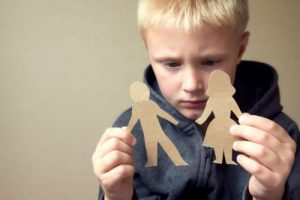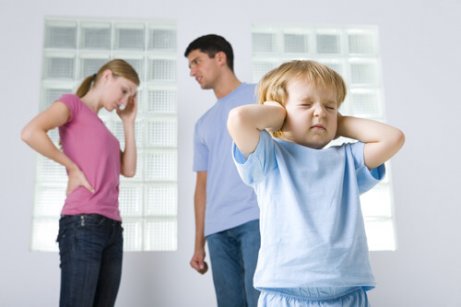How to Help Children Deal with Divorce

When parents separate, it’s important to know how to help children deal with divorce and accompany them during this difficult process.
For children, the separation of their parents is a traumatic experience. If you or someone close to you finds themselves in the midst of a divorce, take note of the following recommendations.
The truth is, we always strive to do what’s best for our loved ones. However, sometimes a lack of experience or information in certain circumstances can limit our capacities.
One thing you must understand is that divorce is one of the most painful and difficult life events a person can experience. And despite misconceptions, divorce is just as hard for men as it is for women.
It’s a tragic change that affects a person’s emotional and even physical health, and causes great suffering…

Something that makes the process even more tragic is when children are involved. Children experience great pain as a result of their parents’ separation.
However, if you follow the suggestions below, you can avoid greater suffering and reduce problems for your children.
Learn how to help children whose parents are going through a divorce
Below are some tips for helping young ones deal with divorce. It’s important to do everything within our power to minimize the harshness of this trauma.
Spend quality time with them
It’s normal to feel overwhelmed when you yourself are going through a separation. You probably need time for yourself – your own space. This is especially true if you’ve had to move.
Just the same, try to spend as much quality time as possible with your little ones. They need it more than ever, and you’re the best person to meet their need.
Show your children love and affection
Express affection towards your children at all times. This means giving hugs, kisses, placing your arm on your child’s shoulder or back, etc.
It also means telling your litte ones how much you love them and how important they are to you.
Don’t ever assume your children know how much you love them… You should always demonstrate it.
Maintain open and honest communication
Talk with your kids whenever it’s necessary. What’s more, be clear, honest, and direct – don’t dance around the issues.
Of course, it’s important to take into account your child’s age and maturity level, but you should never lie to your child.
Also, when your child speaks to you, listen carefully. Don’t discredit or minimize what your children are experiencing and feeling.
This will make them feel safe and cared for, and also encourage them to continue to be open with you rather than hiding in their emotions.
Do everything possible to keep them from feeling guilty
It’s not uncommon for children to blame themselves for their parents’ separation. Therefore, it’s best to be very clear at all times that your children are not to blame.
At the same time, your kids need to understand there is nothing they can do to reunite you and your partner.
Understand their pain and desire to bring you back together, assuring them that, while the situation is permanent, the pain will lessen with time.
Observe your children’s behavior
More than likely, you’ll notice some behavioral changes in your child throughout the separation process.
It’s important that you observe your little one to determine if his or her behavior is within what is considered “normal.”
This is the only way you have to detect behavioral changes or changes in emotional response.
If you notice that your child is becoming apathetic or indifferent, then he or she may be experiencing depression. The same is true if you observe aggression in your child.
Maintain discipline

Don’t forget to continue forward with discipline and routine that’s similar to that which existed prior to the divorce. Your children need structure, limits and discipline in the home.
These factors are truly fundamental in providing your little ones with stability, security and peace. As much as possible, avoid unnecessary changes and maintain limits and routines as much as possible.
Be careful with your relationship with your ex
We know this can often be very challenging, but for the emotional well-being of your children, it’s important you strive for a healthy relationship with your ex.
Make an effort to keep your cool when interacting with your ex and keep your children out of middle. Try to come to agreements with your ex without aggression and power struggles.
Never talk bad about your ex when your children are present. Keeping your words, emotions and body language in check are a way to care for your children.
Don’t keep your children away from your ex
As much as possible, encourage a fluid relationship between your children, your ex, and also your ex’s family.
Your little ones need the support of their loved ones and their family circle. Remember, this is about striving to do what’s best for your children, despite any personal feelings you may hold.
Seek support from your loved ones
In times like this, it’s important that you get the support you need so that you can in turn provide the support your children need.
Reach out to friends and families that can help you manage your emotions and can give you a hand when you need it.
Divorce is one of the most stressful life events anyone goes through. Only the loss of a loved one and moving are even in its class, difficulty-wise, and divorcing generally involves both of those as well.
-Emily Doskow-
Helping a child whose parents are getting a divorce isn’t easy, but it’s absolutely necessary.
Even though divorce may be the right step towards your family’s health and happiness, it’s none-the-less a traumatic and life-changing experience for children.
They deserve our best, so it’s important we help them through it.
All cited sources were thoroughly reviewed by our team to ensure their quality, reliability, currency, and validity. The bibliography of this article was considered reliable and of academic or scientific accuracy.
- Amato, P.; Keith, B. (1991). Parental divorce and the well-being of children: A meta-analysis. Psychological-Bulletin, 1991 Jul; 110 (1): 26-46
- Caplan, G. (1993). Prevención de los trastornos psicológicos en los hijos de padres divorciados. En: Caplan, G. Aspectos preventivos en salud mental. Barcelona: Paidós.
- Garin, P. B. (1992). Un análisis exploratorio de los posibles efectos del divorcio en los hijos. Psicothema, 4(2), 491-511.
- Salvador, G. P., & Del Barrio, V. (1995). El efecto del divorcio sobre la ansiedad de los hijos. Psicothema, 7(3), 489-497. https://www.redalyc.org/pdf/727/72707302.pdf
- Shaw, D. (1991) The Effects of divorce on children’s adjustment. Behavior Modification, 15(4), 456-485.
- Testor, C. P., Pujol, M. D., Vidal, C. V., & Alegret, I. A. (2009). El divorcio: una aproximación psicológica. Universidad Ramon Llull, 2, 39-46. https://www.researchgate.net/profile/Carles_Testor/publication/242775375_El_divorcio_una_aproximacion_psicologica/links/54e43ae50cf282dbed6ea7ba/El-divorcio-una-aproximacion-psicologica.pdf
This text is provided for informational purposes only and does not replace consultation with a professional. If in doubt, consult your specialist.








